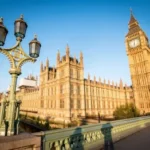Energy News Beat
Britain’s climate watchdog has privately admitted that a number of its key net zero recommendations may have relied on insufficient data, it has been claimed.
Sir Chris Llewellyn Smith, who led a recent Royal Society study on future energy supply, said that the Climate Change Committee only “looked at a single year” of data showing the number of windy days in a year when it made pronouncements on the extent to which the UK could rely on wind and solar farms to meet net zero. [emphasis, links added]
“They have conceded privately that that was a mistake,” Sir Chris said in a presentation seen by this newspaper. In contrast, the Royal Society review examined 37 years’ worth of weather data.
Last week Sir Chris, an emeritus professor and former director of energy research at Oxford University, said that the remarks to which he was referring were made by Chris Stark, the Climate Change Committee’s chief executive.
He said: “Might be best to say that Chris Stark conceded that my comment that the CCC relied on modeling that only uses a single year of weather data … is ‘an entirely valid criticism’.”
The CCC said that Sir Chris’s comments in a presentation given in a personal capacity in October, following the publication of his review, related solely to a particular report it published last year on how to deliver “a reliable decarbonized power system”.
Enshrined in law
But, in response to further questions from this newspaper, the body admitted that its original recommendations in 2019 about the feasibility of meeting the 2050 net zero target were also based on just one year’s worth of weather data.
The recommendations were heavily relied on by ministers when Theresa May enshrined the 2050 target into law.
A CCC spokesman said: “We stand by the analysis.”
In October 2021 The Sunday Telegraph revealed that assumptions underpinning the committee’s 2019 advice to ministers included a projection that in 2050 there would be just seven days on which wind turbines would produce less than 10 percent of their potential electricity output.
That compared to 30 such days in 2020, 33 in 2019, and 56 in 2018, according to analysis by Net Zero Watch, a campaign group.
Sir Chris’s report for the Royal Society, published in September, concluded that a vast network of hydrogen-filled caves was needed to guard against the risk of blackouts under the shift to wind and solar generation, which the Royal Society described as “volatile” because it depends on wind and sun to produce energy.
The report was one of the starkest warnings to date of the risks faced when relying on intermittent weather-dependent energy sources without sufficient backup.
Overestimate
It stated: “The UK’s need for long-term energy storage has been seriously underestimated… Studies that do not consider long sequences of years underestimate the need for long-term storage. Studies of single years cannot cast light directly on the need for storage lasting over 12 months and overestimate the need for other supplies.”
In a presentation delivered on Oct. 31, 2023, Sir Chris said: “By looking at one year you underestimate storage and you grossly overestimate the need for everything else. That’s exactly what the Committee on Climate Change [has] done.”
He added: “The Committee on Climate Change, as I already said, looked at a single year and they have conceded privately that that was a mistake. But they are still saying they don’t differ that much from us. Well, that’s not quite true.”
The Royal Society report found that up to 100 Terawatt-hours (TWh) of storage will be needed by 2050 to mitigate variations in wind and sunshine. This was based on 37 years of weather data rather than the single year relied on by the CCC.
Real weather data
The report noted that the CCC model required “a much greater level of supply … from other sources, and/or wind and solar than would have been required if storage had been allowed to transfer energy between years.”
A CCC spokesman said: “Our recent report modeled the 12-month operation of Britain’s power system in 2035 using hourly energy demand and real weather data from a low-wind year, stress-tested to simulate a 30-day wind drought.
“We welcome Sir Chris’ work, which considers other aspects of the energy challenge in 2050, under different assumptions about the future energy mix.”
Asked if the CCC disputed Sir Chris’s account, the spokesman said: “We’ve got nothing further to add.”
Source: Climatechangedispatch.com
ENB Top News
ENB
Energy Dashboard
ENB Podcast
ENB Substack
The post UK Climate Chiefs Admitted Net Zero Plan Based On Single Year Of Data appeared first on Energy News Beat.








